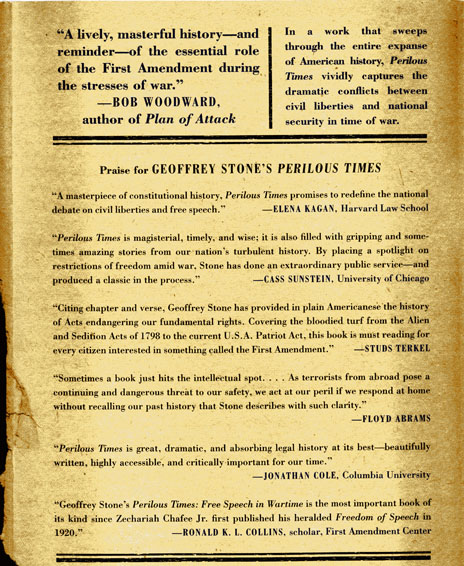Rare Book Monthly
Articles - February - 2005 Issue
Comments based on a reading of Perilous Times by Geoffrey R. Stone
During the Civil War Lincoln suspended the writ of habeas corpus that "enables an individual who has been detained by government officials to seek a legal determination of the legality of his detention." Therefore no court reviewed them. Lincoln's defense was that, in Civil War, the enemy passes among you and must be separated. When the courts ruled against him he ignored them. This is the only instance cited in this book where repression does not seem to have been the primary motivation.
During World War I paranoia gripped the nation. President Wilson sought repressive measures in 1917 [The Espionage Act] to legislate against disloyal expression. He specifically sought to muzzle the press. In 1918 further legislation made it possible for organizations such as the American Protective League [with its 200,000 members] to file reports of legal violations on the basis of "hearsay, gossip and slander." Prosecutions would later be brought against those who opposed the war and they would be sent to jail for years or deported. When there was "clear and present danger" the first amendment was sacrificed.
In the years before World War II there was a sense that it had not been necessary or appropriate to reduce first amendment rights and the expectation seemed to be that, should war come again, no such measures would be anticipated. Japanese-Americans soon learned otherwise. In California in particular, local demagoguery fueled outrage over Pearl Harbor leading the United States government to intern more than 120,000 Japanese-American citizens. No crimes were ever proven and during 1944 such programs were ended. This was simply racism. No similar programs were enacted against Germans or Italians.
In the waning days of the war the Soviet Union emerged as a direct threat to the United States. The Republican Party, long out-of-power, sought to portray Democrats as soft on communism and Truman responded by creating a loyalty program in 1947 that laid the basis for the anti-communist hysteria that would grip America in the next decade. In 1950 Joseph McCarthy, a new senator, emerged as a member of the House Un-American Activities Committee and began to make a name as an anti-communist firebrand. Under his emerging demagoguery over the next four years thousands of people were subpoenaed, often based on hear-say and other unsubstantiated accusations, to defend themselves. For many their way out was to implicate others. As a consequence thousands of people, most of them innocent, were drawn into a net of accusation by implication and betrayal. There were no trials. McCarthy simply made accusations, craven employers fired and friends disassociated. It was a period of extraordinary injustice. Bombast ruled and people who knew better remained silent. The Supreme Court had been expected to rule against the HUAC but did not. It would not be until 1957, under a reconstituted Supreme Court, that the Justices would reassert the primacy of the first amendment and bring to an end this shameful period. McCarthy was condemned by the Senate in the fall of 1954 and died of acute alcoholism in 1957. For a period of five years the first amendment rights of all Americans were in effect suspended.


































